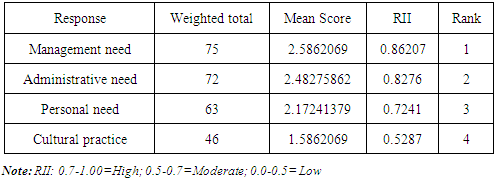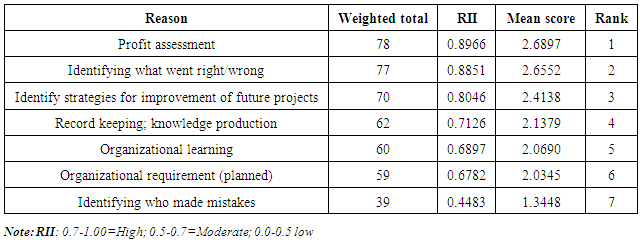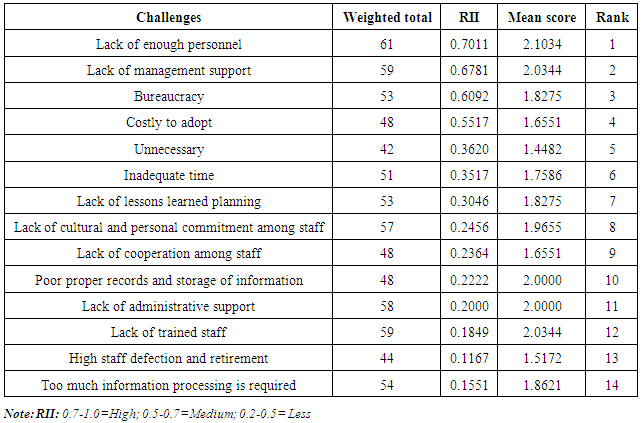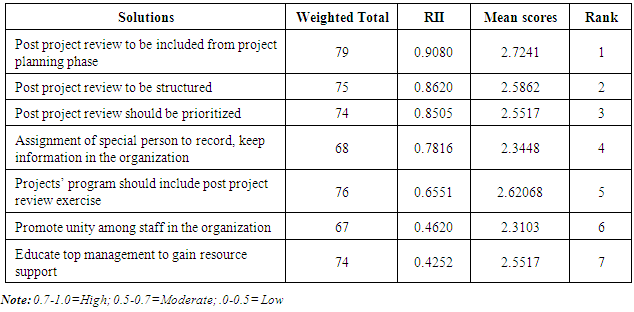-
Paper Information
- Paper Submission
-
Journal Information
- About This Journal
- Editorial Board
- Current Issue
- Archive
- Author Guidelines
- Contact Us
Management
p-ISSN: 2162-9374 e-ISSN: 2162-8416
2017; 7(5): 161-167
doi:10.5923/j.mm.20170705.01

Post Project Review and Organizational Learning: A Reflection of Building Contractors Practices
Harriet K. Eliufoo
School of Architecture, Construction Economics and Management, Ardhi University, Dar es Salaam, Tanzania
Correspondence to: Harriet K. Eliufoo, School of Architecture, Construction Economics and Management, Ardhi University, Dar es Salaam, Tanzania.
| Email: |  |
Copyright © 2017 Scientific & Academic Publishing. All Rights Reserved.
This work is licensed under the Creative Commons Attribution International License (CC BY).
http://creativecommons.org/licenses/by/4.0/

The main objective of this study was to assess post project review practice as a means for organizational learning for building contractors in Tanzania. Specifically the study assessed the nature of post project review and examined how it serves as an organizational learning tool for building contractors. The study investigated challenges pertaining to carrying post project reviews. A total of 35 questionnaires were administered to building contractors based in Dar es Salaam City, supported by in-depth unstructured interviews. The study has established that most firms are aware of post project review. However despite it being recognized as an important tool towards organization learning, the review is neither planned for nor structured. Noted that the decision to carry it out or not rested with top management, who are also the major participants whenever it is done. The study recommended that post project review to be formalized hence planned for from commencement of project; organizations to have proper records to facilitate the review process; inclusion of post project review as one of the key functions in a project that is supported by company guidelines and policy.
Keywords: Post- project evaluation, Building contractors, Organizational learning, Tanzania
Cite this paper: Harriet K. Eliufoo, Post Project Review and Organizational Learning: A Reflection of Building Contractors Practices, Management, Vol. 7 No. 5, 2017, pp. 161-167. doi: 10.5923/j.mm.20170705.01.
Article Outline
1. Introduction
- The dynamic nature of the construction industry coupled with uncertainties in budgets, technology and processes create challenges to the performance of the project team [1] organizations engaged in project based activities face challenges originating from the tendency of decentralization, short-term emphasis on project performance and distributed working practices that inhibit knowledge transfer in the organization [2]. In this regard proper planning, optimal resource allocation and scheduling are essential prerequisites for project performance [3]. Application of past knowledge and organization learning practices have been stated as means for organizations to improve project performance [4, 5]; that, organizations that utilize their past experience are likely to succeed than those which do not. And also that the learning from experience becomes a key tangible asset for an organization [5] Review of project performance is viewed as powerful and useful in enhancing future projects’ performance [6-8]. Post project review has been explained, as not about allocating problems and blames but rather, about setting directions towards organizational learning [9, 10]. Problems of contractors’ performance in the construction industry have been identified in various research [11, 12]. Tanzania construction industry experience is no exception as contractors have over time exhibited performance setbacks ranging from, delay in completion of projects, poor coordination, inaccurate cost estimates, low management competency, poor planning, inadequate resources, and a low technological base [13-17]. This study investigates post project review practices of building contractors in Tanzania as a means towards organizational learning, assesses its nature, examines how it serves as an organizational learning tool and identifies challenges in its application. The study is limited to local building contractors in Tanzania based on their relatively lower performance challenges compared to foreign contractors practising in Tanzania [19, 15].Post project review is recognized by various practitioners as a means of organizational learning for future benefits and also as a problem solving cycle done after project closure [18]. Post project review is expected to bring in an important opportunity for organizations to learn through knowledge management. This is so since organizational learning has been explained to be a catalyst for an organization to understand how to improve its working ability through better learning capabilities [20]. Post project review is viewed to contribute positively to organizational learning process as it is a vital tool of knowledge management [21]. It is a potential tool in knowledge creation for projects and improvement of organizational learning; thus knowledge created after a post project review becomes an innovation in future projects [22].Arguments exist that a project should not end at the production of a new product only but it should include imparting learning to the organization. In so doing the organization strengthens its learning process for improvement of new projects and avoids repetitive mistakes. It therefore follows that an adequate investment in post project review is required in organizations [9]. The objective of post project review is also viewed as geared towards initiation and facilitation of sustainable learning processes in an organization. This subsequently results to effective learning for an organization and creates competitive advantage [23].
2. Post Project Review
- Post project review has been defined as the final formal examination of any lesson that may be captured, learned and used for future benefits of a project [23]. In this study it is taken to encompass, an internal assessments of previous completed projects for the aim of creating a knowledge base, identifying lessons learned for improvement of future projects while enhancing organizational learning.
3. Organizational Learning
- Organizational learning is viewed as a product of post project review. This is based on the notion that looks at organizational learning as a tool that captures and processes experiential knowledge for enhancement of future projects [23]. Agreement by researchers is that organizational learning is a change of knowledge for an organization which is a function of experience. It is a process of creating, retaining and transferring of knowledge occurring from organization experience. Such knowledge is from both the internal and external environment from which the organization is operating [24].Chen (2005) cited by Inocencia and Jose [25] defined organizational learning as a continuous process in which the organization adjusts itself, utilizing and elevating its knowledge resources to uplift and adapt to both internal and external environmental changes. This was explained as a strategy to maintain a competitive position. Organizational learning definition though articulated differently by various authors [8, 26], a consensus is noted of the outcome of a positive transformation. Similar outcomes have been identified for lessons learned [27-30].The nature of post project review is that it requires routine collection, processing and dissemination of knowledge in the organization in order to remove any likely barriers for achieving sustainability and progress [31]. There is also no specific time that has been identified as appropriate for post project review as this depends on the nature, complexity and duration of the project [32]. It can be done during the course of a project to observe if the project is on the right track or after the closure of a project; assessing both short and long term outcomes.
4. Knowledge Management and Post Project Review
- The process of post project review involves management of knowledge which is said to be complementary to organizational learning [8]. Meaning that existence of good practice of organizational learning by firms depends on how knowledge is managed. The association between knowledge management and organization performance has been discussed by various researchers [33-36]. The process of lesson learned is conceptualized as commencing from individuals, groups and finally spreading in the organization [23]. That, it is perceived effective learning is through frequent capitalization of previous experience. Success and barriers to learning have also been explained [29] Whereas success to learning incorporates having a simple yet formal lessons learned procedure that is proven to add value and able to focus on process improvement. Barriers to learning engulf team based shortcomings such as reluctance to blame others when they commit mistakes and poor internal communication; managerial problems such as time management constraints and bureaucracy. Other barriers to learning are identified as associated with project uniqueness, temporary nature of project, organizational culture and defensive behaviour where people do not want to review previous wrong doings to secure their personality [37].
5. Methodology
- Building contractors as categorized by the Tanzania Contractors Registration Board from class one, two and three based in Dar es Salaam were selected as the unit of analysis. The three classes taken are viewed by the researcher to represent a homogeneous group in terms of complexity and size of projects that they construct. Building contractors based in Dar es Salaam were considered as Dar es salaam City is the most active in construction activities for Tanzania hence viewed would provide an information rich area for the problem being investigated. Questionnaires and semi-structured interviews were used as tools for data collection. The validity of the research was assured by research questions addressing the research objectives; while reliability was ensured by all respondents receiving the same set of questions.According to the Contractors Registration Board’s Register, the total number of local building contractors in year 2016 was 176 for class one, two and three. An approximate of 20% of the total population was taken as the sample size, hence 35 questionnaires were distributed. The qualifications of respondents from the contractor’s firms were of technical and managerial background; and included managing directors, administrators, architects engineers, quantity surveyors, contract managers and general foremen. Of the 35 questionnaires distributed, 29 were returned representing a response rate of 82%.
6. Data Analysis
- The degree of awareness of post project review was investigated and all respondents’ response was that they are aware of the post project review concept. However the degree of awareness was observed to vary amongst the respondents. 11 contractors out of 29 (38%) indicated to be highly aware of post project review and 16 out of 29 of all contractors (55%) were moderately aware of the concept. With regard to investigating the nature of post project review in organization, as to whether it was formally structured or informally done and unstructured, 93% affirmed that it was not structured. Respondents further reported that at commencement of a project there was no planning made for post project review. Respondents were also to provide their perception of how they see the need or significance of post project review for a construction project. A 5 - scale Likert scale was used for the respondents to indicate the strength of their perception. Respondents perceived post project review as a management and administrative need, this was reflected in high mean scores of 2.5862 (RII of 0.86207) and 2.4827 (RII of 0.8276) respectively. Cultural practice had the least mean score of 1.5862 and RII of 0.5287. Results are shown in Table 1.
|
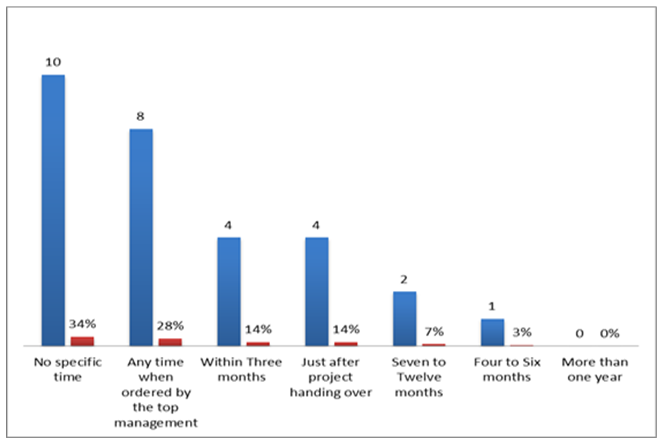 | Figure 1. Time laps for post project review |
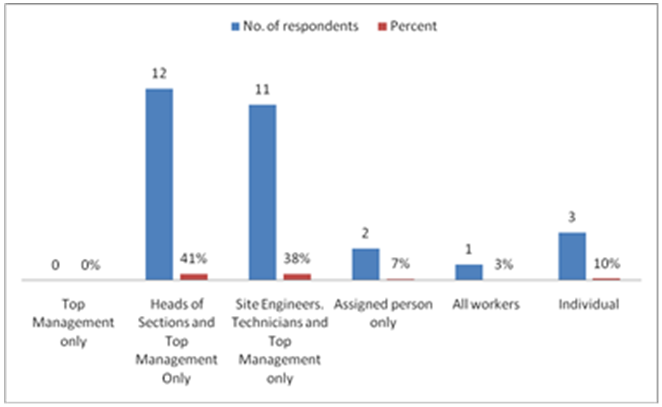 | Figure 2. People involved in post project review |
|
|
|
7. Improvement of Post Project Review Practices
- Responds gave views on possible solutions that can improve post project review practice among local building contractors in Tanzania. It was highly advocated for post project review consideration to be made from the start of project during the planning phase. The second high ranked suggestion was the need to structure post project review in the organization. This scored a mean of 2.5862 and a RII of 0.8620. The third suggested approach was the need of prioritization of post project review process in organizations. The least ranked was the need to educate the top management on the significance of the review so as to provide more support. See Table 5.
|
8. Discussion
- The study has established that most of the sampled building contractors are aware of post project review. However despite it being recognized as an important tool towards organization learning, it is noted that the process is neither planned for nor structured. The lack of a structured framework correlates to a study in Malawi that concluded that vital lessons that could have been learned from project reviews are lost by contractors because of lack of a structured framework. The same loss is hence implicated for building contractors in Tanzania. This further falls in line with the notion that loss of lessons learned, is a feature that still characterizes the construction industry [6].Since the study has established the sampled contractors do not plan for post project review, the implication is that opportunities for “getting it right first time” are lost. As “getting it right” is stated to be a mitigating factor for time and cost overruns for construction projects. [38]. Hence contractors in industry by not carrying post project review fall short in mitigating these overruns. The study also affirms what other studies have reiterated, that the construction industry is inclined to single–loop learning versus double loop learning [2]. Meaning that, the industry responds to changes in internal and external environments by addressing symptoms of problems rather than causes. This is observed in the fact that contractors continue to experience performance shortfalls. Post project review if it were to be appropriately pursued, root causes of many problems could have been solved. Furthermore, the absence of a structured post project review for construction projects also deprives an organization from developing its knowledge management base [39]. It has also been established from findings that post project review practice and effectiveness remains with top management decision. This is a situation that deters organization learning as experience feedback is limited to a certain cadre of workers [25]. Lack of personnel and administrative support have also been identified as amongst the top challenges for its implementation.
9. Implication to Practice
- The recommendations from the study are expected to provide a base for building contractors to understand the significance of prior- planning for post project review; and the need for it to be formalized. Hence from the outset to recognize the need to have proper project documentation and utilization of lessons learned from previous projects’ experience. The study paves way to building contractors on how to plan for review, carry out a review and document for implementation of lessons learned. The study also puts forth to contractors to understand the link between post project review, organizational learning and project performance. That success in project performance cannot be alienated from a learning organization.
10. Recommendations
- Acknowledging the link of project success and post project review [6-10], it is recommended that building contractors when conducting post project review to ensure that it is formalized and structured. Essentially, the study recommends that post project review to be planned for from commencement of project; organizations to have proper records to facilitate the review process; inclusion of post project review as one of the key functions in a project that is supported by company guidelines or policy for its implementation. Encouraging teamwork is also recommended as it facilitates sharing of experience, knowledge transfer, common understanding and learning.
Study Limitation
- One of the limitations of this study is its confinement to Tanzania building contractors only. The other is the inability to generalize the findings due to the small sample size. However, it is viewed by the author the study has been successful in providing a reflection of the post project preview practice of building contractors in Tanzania. A more robust survey study is hence recommended to affirm what has been reflected.
 Abstract
Abstract Reference
Reference Full-Text PDF
Full-Text PDF Full-text HTML
Full-text HTML